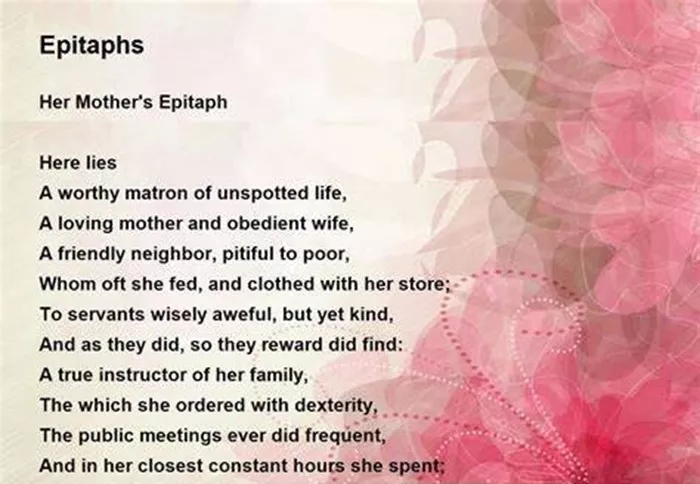Welcome to Poem of the Day – Epitaphs by Anne Bradstreet.
Anne Bradstreet, one of the earliest American poets, is known for her deep reflections on life, death, and faith. In her poem “Epitaphs,” she provides an insightful look at mortality and the human condition. Epitaphs, in the context of the poem, refer to the inscriptions found on tombstones, often reflecting the legacy of those who have passed. Bradstreet’s “Epitaphs” is a poem that delves into the themes of death, remembrance, and the afterlife. This article will explain the key elements of the poem, offering a clearer understanding of its deeper meanings.
Epitaphs Explanation
Understanding “Epitaphs”
In “Epitaphs,” Anne Bradstreet does not merely focus on the physical death of individuals. Instead, she explores the concept of legacy and what is left behind after a person dies. The poem is written in the form of an epitaph, a brief inscription that commemorates the deceased, reflecting on their life and achievements. It is a way for the living to remember the dead and celebrate their legacy.
The poem begins with a straightforward yet poignant statement about the brevity of life. Bradstreet acknowledges that death is inevitable, and each person’s time on earth is limited. This acceptance of mortality is crucial in understanding the themes of the poem.
Themes of Death and Mortality
Throughout “Epitaphs,” Bradstreet addresses the inevitability of death. She conveys a sense of resignation and reflection, acknowledging that everyone will eventually face the same fate. However, while death is a common experience, Bradstreet emphasizes the importance of how one is remembered. The idea of epitaphs becomes symbolic of the way society memorializes individuals after they are gone. The way one lives—through acts of kindness, virtue, or faith—determines how they are remembered.
Bradstreet’s poetic tone is both somber and reflective. Her perspective is not just about the sadness of death, but also about the importance of how one lives in order to leave a meaningful legacy. Through her verses, she encourages readers to think about their own lives and how they will be remembered after their death.
Faith and Spirituality
Bradstreet’s Puritan beliefs also influence the themes in the poem. She views life as a journey toward salvation, with death as a natural transition to the afterlife. For Bradstreet, death is not the end; it is a step toward eternal life with God. In this light, the poem’s theme of death takes on a spiritual significance, emphasizing the soul’s immortality over the temporary nature of physical existence.
The hope of eternal life provides comfort in the face of death. Bradstreet’s faith in the afterlife informs her understanding of death as both an end and a new beginning. By writing “Epitaphs,” she reminds readers of the importance of maintaining their spiritual beliefs and striving to live virtuously in order to secure a place in heaven.
Legacy and Remembrance
Another key theme in “Epitaphs” is legacy. Bradstreet highlights the ways in which people are remembered after they die. An epitaph serves as a final reminder of a person’s character, achievements, and faith. Bradstreet suggests that a person’s true legacy lies not in material wealth or fame, but in the good deeds they have done and the virtues they have embodied during their life.
The poem also raises questions about what is worthy of being remembered. Bradstreet’s own epitaph emphasizes her roles as a mother, wife, and devout believer. Her legacy is rooted in her faith, love for her family, and dedication to God. Through this, she encourages others to consider what they want their epitaphs to say about them. What will people remember when they are gone?
Conclusion
Anne Bradstreet’s “Epitaphs” is a poignant reflection on the inevitability of death, the importance of legacy, and the hope of eternal life. Through simple yet profound language, Bradstreet invites readers to think about their own mortality and the way they wish to be remembered. She reminds us that death is not the end, but a transition to something greater, and that the legacy we leave behind is shaped by the choices we make during our lives. This thoughtful exploration of death and remembrance continues to resonate with readers, making “Epitaphs” an enduring piece of American poetry.

